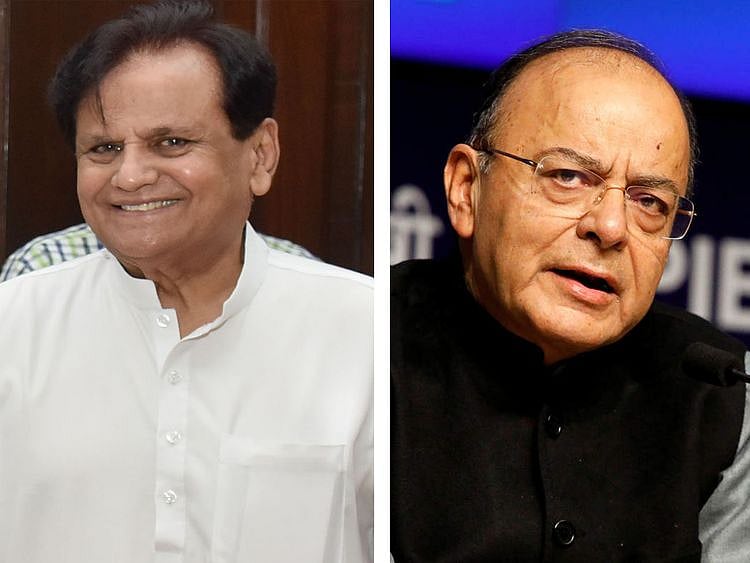Unlike mass leaders, drawing room politicians are never really remembered after they have passed away. Nobody — absolutely nobody — is heard publicly speaking about the absence of Arun Jaitley and Ahmed Patel in national politics.
The BJP’s electoral dominance has continued after Jaitley’s death in August 2019. The Congress party’s electoral decline has not abated since Covid took Ahmed Patel’s life in November 2020. Jaitley was India’s finance minister; Ahmed Patel was treasurer of the Indian National Congress, the closest aide of its president Sonia Gandhi for almost two decades.
These two leaders have left behind big boots, nobody is able to fill.
Arun Jaitley will (rightly or wrongly) not be remembered as finance minister given the slowdown of the Indian economy under his watch. But in politics, his importance may be recalled with the example of the Goods and Services Tax. India needed most of its states to come on board for a national GST, for which the BJP government needed to reach out to state governments ruled by opposition parties and win their support.
BJP's go-to man
This was no easy task, since an expansionist BJP was seeking to extend its dominance to every state and challenge regional leaders who have felt secure in their state capitals for the longest time.
To be at loggerheads with the BJP meant they may not cooperate with the Centre, as often happens in federal democracies. This is where Arun Jaitley’s personal relations with politicians across the board turned out to be useful.
Jaitley had the skill of persuading opponents. This is a skill today’s BJP does not have and does not seem to want. When you are winning election after election, why do you need to persuade those who are against you?
To answer this question, we must think of two recent social movements which have seen the BJP make a retreat. The first was the agitation against the Citizenship Amendment Act, 2019, which has been put in cold storage.
The second was a movement against a set of laws that could have effectively privatised procurement of food grains from farmers. The government had to withdraw these laws after defending them for a year.
If Arun Jaitley was around, perhaps the BJP would have been able to better persuade critics and opponents about such measures. Those who knew Jaitley insist he was a voice of moderation within the union cabinet, and may have been able to persuade the government to do a better job of building consensus.
Jaitley was jokingly known as the “bureau chief” of the BJP, given the number of journalists who he had eating spin and good food out of his hands. The BJP’s dominance over the media continues, but again, the spin is less persuasive, less subtle. Jaitley wouldn’t give journalists the headline as much as he would give them the story, explaining things in context.
Delhi’s chattering classes — opposition leaders, power players, media, foreign diplomats — found in Jaitley an accessible leader whom they could ask tough questions and get a good answer. With the ups and downs in the BJP’s relations with its old ally, Nitish Kumar, it was Jaitley who always had a channel of communication open.
Similarly, he was close to the Badal family of the Akali Dal in Punjab. The Akalis had to break their alliance with the BJP over the farm laws, which suggests a breakdown of communication channels.
Queen’s secretary
Like Jaitley, Ahmed Patel was the man a lot of people felt they could talk to — especially the warring factions of the Congress party across India.
It is quite remarkable how little criticism Sonia Gandhi has received for the decline of the Congress party, which is today staring at possible oblivion. Insulating Sonia Gandhi from criticism and questioning was perhaps the greatest of Ahmed Patel’s many abilities. He was the unnamed source in the “Sonia Gandhi is learnt to be upset” stories.
Ahmed Patel’s word was considered as good as Sonia Gandhi’s across the political spectrum. It was he who actually ran the party, so much so that it seemed he was the party.
Since 2014 if not before, we heard ad nauseam about the Congress party’s old guard not letting the Rahul Gandhi-led ‘new guard’ have real power within the party. We were told that Rahul Gandhi is failing because the ‘old guard’ doesn’t let him succeed. The ‘old guard’, we were told, is Ahmed Patel (because how can anyone question Sonia Gandhi?)
The ‘old guard’ complained it was Rahul Gandhi’s inability to become a real mass leader that is hurting him and the party. It has now been a year and a half since Ahmed Patel’s demise, and much of the ‘old guard’ is sulking on the sidelines. Rahul Gandhi is de facto president of the Congress party, but the Congress continues to fail.
When Ahmed Patel died, the question in the corridors of power was, ‘Who will be the new Ahmed Patel?’ There is nobody. There is no one in the Rahul Gandhi coterie who comes close, whose word can mean the word of the party. Sonia Gandhi has begun facing hard questions.
If Ahmed Patel was around, perhaps the Congress would still have lost Punjab, but maybe not so badly. He would perhaps not have allowed Navjot Singh Sidhu to be made party president, a decision that proved disastrous.
Perhaps he would have managed the situation in such a way that Captain Amarinder Singh would not have rebelled. Ahmed Patel had his foibles but he was a crisis manager whom even Rahul Gandhi needed.
In the absence of Ahmed Patel, the Congress looks like a house of cards about to collapse.
Network Links
GN StoreDownload our app
© Al Nisr Publishing LLC 2026. All rights reserved.
